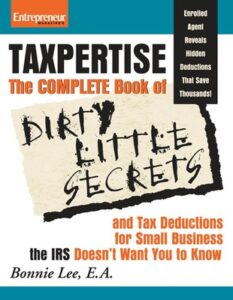Note: This is not financial advice. Each person should check with their accountant to determine the best strategy for their specific situation.
Filing day is April 18; don’t forget these deductibles
As tax time rolls forward, independent planners should plan on the end to some Covid-19 concessions by the IRS and a surprising boost for businesses who take deductions for restaurants off their taxes.
We spoke with Bonnie Lee, an Enrolled IRS Agent, CEO of Taxpertise, a tax and accountancy firm in Sonoma, California, and the author of Taxpertise, the Complete Book of Dirty Little Secrets and Tax Deductions for Small Business.
Deadlines and Exemptions

“There is no longer an additional Covid extension on filing your tax returns,” explains Lee. “The deadline will no longer be extended. For this year, because of Emancipation Day, filing day is April 18.”
Lee says that as IRS workloads stay the same or worsen, filers should bank on direct deposit as the best way to make sure they get their refund. “I know people from last year who are still waiting for their mailed refunds,” Lee explains.
Read More: 7 Considerations: Financial and Insurance Planners Plot the Return to Productive Meetings
Another change this year is that, so far at least, the government has not allowed an exemption on unemployment of up to $10,200 as they did last year.
“They may change that in mid-year and adjust it but as of right now unemployment benefits are now fully taxable on the federal level,” she adds. “That’s different state-by-state. In California, unemployment is not considered taxable income. Check with your state to find out if you must pay taxes on the unemployment compensation you received.”
Deduction Details
One of the biggest benefits to independent business owners, says Lee, will be the meals deduction.
The Federal Government and the IRS has decided that business and travel meals expenses incurred in a restaurant, even if on a take-out or room service basis, during 2021 and 2022 will be 100% deductible.
Prior to 2021 and after 2022, meals were only 50% deductible. “If you dined out for business or entertained clients at a restaurant, a hotel restaurant or even at a food court in a conference center, then that expense is 100% deductible,” she explains.
It’s important to note, though, that if you or your company bought groceries to make the meal, that is not 100% deductible. “It will be subject to the 50% haircut,” she said.
The IRS says that meals and food donated to a qualified 501(c)(3) nonprofit are 100% deductible as a charitable contribution on Schedule A itemized deductions. Meals are also 100% deductible if they are provided at a marketing or promotional event open to the general public. Company events like parties or happy hours can be deducted at the full 100%. Entertainment is not deductible.
“The biggest change is that business meals are now 100% deductible.”
Another deduction that is staying is personal protection equipment if you use it for work (masks, tests, etc.). “Those are 100% deductible,” Lee points out.
Read More: Budget Financial Meetings: Doing More with Less
Home office expenses also continue to be deductible if you are self-employed. However, Lee explains that “if you’re on a W2 with your employer and they are taking out funds for taxes, you can’t deduct anything for your home office. The deduction is not allowed at the federal level. However, check with your state to determine if you can deduct it on the state income tax return. It is allowed in California.”
Lee says that with so much remote working lately, this may change down the line. Currently, if you’re home and not in the office, you can’t deduct expenses related to work if you are not an independent contractor.
This article appears in the February/March 2022 issue.




